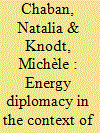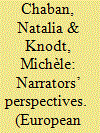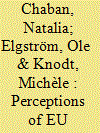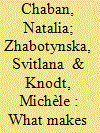|
|
|
Sort Order |
|
|
|
Items / Page
|
|
|
|
|
|
|
| Srl | Item |
| 1 |
ID:
142064


|
|
|
|
|
| Summary/Abstract |
This paper examines a supranational actor, the European Union (EU), as a producer of energy diplomacy. This study uses a comparative analytical framework of state-centred vs. multistakeholder diplomacies to explore EU energy diplomacy towards the ‘emerging’ powers of Brazil, India, China and South Africa (BICS). It also elaborates the multistakeholder model by advocating the inclusion of a new element – a consumer of diplomatic actions – into its conceptualization. In this way the paper suggests a new synthesis of the concepts of multistakeholder and public diplomacies. Advancing the notion of energy diplomacy, our analysis suggests that this type of diplomacy goes beyond state actors as producers of diplomatic outcomes, and is no longer confined to the norms of security of supply and competitiveness; EU energy diplomacy is a complex blend of multistakeholder and state-centred diplomacies, participants (producers and consumers) and communication modes. This comprehensive approach to diplomacy – led in the EU’s case by norms of sustainability, competitiveness and security of supply – is a response to the challenges of global governance, multipolarity and multinational cross-sectoral networks.
|
|
|
|
|
|
|
|
|
|
|
|
|
|
|
|
| 2 |
ID:
168957


|
|
|
|
|
| Summary/Abstract |
The role of newsmakers as intermediaries in the shaping of external perceptions and reception of narratives advanced by different actors remains sparse in EU studies. This contribution fills this gap and addresses the personal images of the EU of newsmakers. We contribute to the understanding of those personal perceptions and their link to professional values of audience interest, newsworthiness and objectivity in reporting the EU. The article will demonstrate that all journalists perceive EU coverage in their respective locations are led by local priorities. Negative views of the EU as a weakening, biased, ineffective, elitist and arrogant actor are dominant. Arguably, they create conditions for the birth and dissemination of Euro-distant and even Euro-sceptic media narratives. The article will explain why this is the case while drawing on political/ideational and business/financial explanations.
|
|
|
|
|
|
|
|
|
|
|
|
|
|
|
|
| 3 |
ID:
170753


|
|
|
|
|
| Summary/Abstract |
A small but growing literature has started to analyse the European Union (EU) ‘as an effective peacemaker’. We make a contribution to this field by investigating EU mediation effectiveness in the Russia–Ukraine conflict. The focus is on perceptions of effectiveness. Based on information from semi-structured interviews, we compare EU self-images with Ukrainian evaluations of EU mediation efforts. How effective is the EU, including its Member States, deemed to be? What factors are believed to lie behind perceived (in)effectiveness? We concentrate on four such factors, derived from the mediator literature: perceived (im)partiality, coherence and credibility and, finally, evaluations of the EU’s mediation strategies. Both internal and external views singled out EU member states as the most effective actors in current mediation. The role of EU was seen in ambivalent terms by both sides. All the four determinants of mediation effectiveness are discussed in our material, but differ considerably in the degree of attention given to each of them. While (im)partiality is not a factor that is linked to effectiveness in any straightforward way, EU incoherence is associated with inconsistent and weak policies, notably in the Ukraine material.
|
|
|
|
|
|
|
|
|
|
|
|
|
|
|
|
| 4 |
ID:
191235


|
|
|
|
|
| Summary/Abstract |
A long-lasting, large-scale power blackout has a huge impact on the infrastructure of public life, as well as on critical infrastructure including electricity and water supply. At the same time, it can be observed that the share of renewable energies, and thus the possibility of self-sufficiency, has increased enormously in recent years. This contribution focuses on the question to what extend citizens are willing to share their electricity resources in order to make their city more resilient. In reference to Ostrom's concept of club or common goods, it can be shown if and how the private good of citizen's electricity resources can be transformed into a club or even a common good. Drawing on survey data from the city of Darmstadt we investigated the willingness to share electricity and to participate in participatory formats to enhance urban resilience.
|
|
|
|
|
|
|
|
|
|
|
|
|
|
|
|
| 5 |
ID:
193228


|
|
|
|
|
| Summary/Abstract |
Contributing to the ‘narrative turn’ in International Relations and offering an answer to the question ‘What makes a strategic narrative efficient?’, this article adds to the methodological theorization of the formation and projection phases of the narrative’s lifecycle. We suggest that the impact of the constructed image in the narrative can be reinforced by the interplay of at least three projection properties: (1) content accentuation and priming, through iterations; (2) content contextualization, through historical and cultural resonance with the consumers’ memories; and (3) content verbalization, through narrative tactics that evoke a range of the consumers’ involved attitudes to the framed image. These properties, being intrinsic ingredients of the projected content, tend to enhance emotions. In our work, they get traction in the antagonistic narrative tailored by the Russian propaganda to depict Ukraine orientated towards the European Union (EU). The empirical case study analyses articles published on the Russian e-news platforms portraying the EU granting Ukrainians visa-free travel to the Schengen area in 2017, a milestone in Ukraine–EU relations. We define Russia’s narrative, created in reaction to this event, as antagonistic and consider it to be a precursor of the aggressive narrative crafted/employed by Russia to justify its 2022 military assault on Ukraine’s sovereignty.
|
|
|
|
|
|
|
|
|
|
|
|
|
|
|
|
|
|
|
|
|